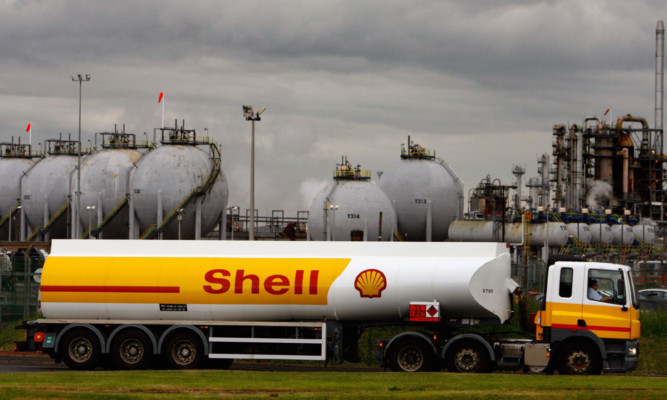
Retailers accused of ‘profiteering’ as UK domestic fuel bills soar by 13%.
The UK is being stung by the biggest fuel rip-off in Europe despite a dramatic fall in oil and gas prices.
A damning new report has revealed household energy bills in this country have risen faster than any other over the last three years.
And prices at the forecourts have dropped by as little as a third of the 60% fall in crude oil prices, leaving UK motorists with among the most expensive diesel and petrol prices in the EU.
Campaigners last night demanded immediate action to end the fuel misery for millions as winter continues its icy grip on the country.
Gillian Guy, of Citizens Advice, said: “There can be no more ifs and buts all energy firms must now cut household bills.”
And Howard Cox, founder of the FairFuel UK campaign, accused fuel retailers of “pure opportunistic profiteering” for not passing on all of the drop in wholesale oil prices.
A new EU study obtained by The Sunday Post looked at the prices paid for household energy and fuel across 28 member countries, with the results laying bare the true extent of the rip-off faced by UK consumers every day.
The average gas bill in the EU went down by 0.5% over the last three years.
But in Britain, where temperatures this weekend dropped to their lowest level for two years, they rose by a staggering 13%.
Wholesale gas costs have fallen dramatically over the last year, and currently sit at a four-year low, but customers are still being charged at least three times the price their suppliers pay for the fuel.
The utility firms buy their gas well in advance to try and insulate themselves against changes in the market, so wholesale price falls do not always filter through to consumers immediately.
According to energy regulator Ofgem the average dual fuel bill in Britain is £1,326 a year.
And TheEnergyShop.com estimates that if wholesale gas price falls had been passed on, consumers would have seen their average household bills drop below the £1,200 mark.
However, scandalously, of the Big Six energy firms, only E.On has cut its standard gas tariff in recent weeks, but by just 3% the equivalent to a paltry £24 a year.
The report compiled for EU’s Industry, Research and Energy Committee also compared electricity costs across the whole of the continent.
It showed domestic bills have plummeted in 13 countries since 2011.
However, hard-pressed British householders have been forced to stomach a 10% hike in prices more than double the average increase across the rest of the EU.
This is despite wholesale electricity prices also coming down.
SNP Energy Spokesman, Mike Weir MP, said: “As the country is gripped by wintry weather, many will be struggling to heat their homes.
“The Scottish Government has called on ScottishPower, SSE, E-On, EDF, RWE/npower, Centrica and Energy UK to ensure households and businesses benefit from the drop in wholesale prices.
“The recent falls in wholesale energy costs and oil prices have not been reflected in our energy bills, and if the companies are not prepared to positively react to these changes and pass them on to consumers, then they must be compelled to do so.”
Gillian Guy echoed those views.
She said: “Many people are struggling to heat their homes and to keep a roof over their head.
“The energy market must work for consumers, not just add to their misery.
“It is unacceptable that energy firms have not even provided an adequate explanation for why they have so far failed to reduce prices.”
And Which? executive director, Richard Lloyd, added: “Energy bills continue to be the top consumer concern, so we would expect to see companies behaving fairly and passing on lower costs to all their customers.”
The EU report also looked at petrol and diesel costs and the UK didn’t fare much better in this area.
Drivers in the UK have paid the highest diesel prices in the EU for the last three years, with the fuel costing 34% more in this country than in the cheapest place, Luxembourg.
The EU report cites the 60% tax paid on diesel, 12% above the European average, as the main reason for the UK topping the table.
For unleaded, the UK pays the fifth highest price for the fuel in Europe, but was joint highest with the Netherlands in terms of how much goes to the tax man.
According to the FairFuel UK campaign, prices on forecourts across Britain have fallen by around 20% since the summer but the global oil price has gone down by 60% over the same period.
Fuel is bought by the wholesalers with shorter lead times, typically up to eight weeks, than gas or electricity, so the full drop in oil prices should be showing in fuel prices by now if it was being passed on.
A spokesman for the Department for Energy and Climate Change said: “Our analysis of UK energy prices has shown that gas prices are the second lowest in Europe and electricity prices were the sixth lowest.”
Report by Andrew Picken and James Millar

Enjoy the convenience of having The Sunday Post delivered as a digital ePaper straight to your smartphone, tablet or computer.
Subscribe for only £5.49 a month and enjoy all the benefits of the printed paper as a digital replica.
Subscribe